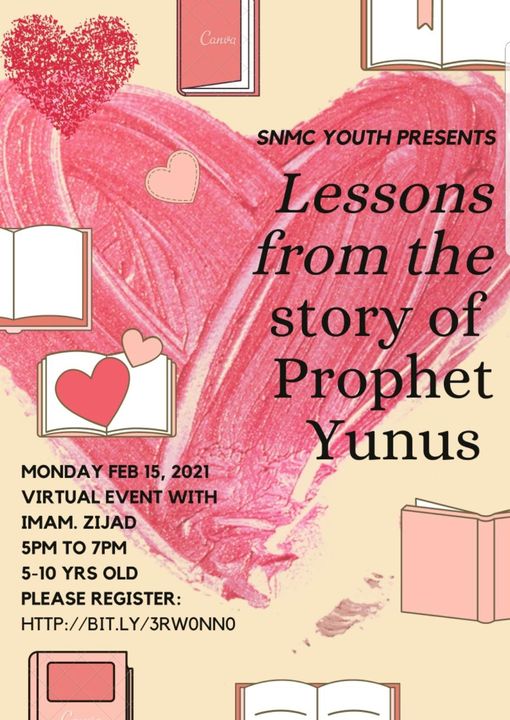A Moment with Our Prophet, Muhammad (S)
By Imam Zijad Delic
Day 197: Islam is the Natural and Easy Way!
A Moment with Our Prophet, Muhammad (S) — By Imam Zijad Delic
Narrated by Abu Huraira (r) that the Prophet (S) said: “Verily, the religion is easy, and no one burdens himself/herself in religion but that it overwhelms him/her.”
عَنْ أَبِي هُرَيْرَةَ عَنْ النَّبِيِّ صَلَّى اللَّهُ عَلَيْهِ وَسَلَّمَ قَالَ إِنَّ الدِّينَ يُسْرٌ وَلَنْ يُشَادَّ الدِّينَ أَحَدٌ إِلَّا غَلَبَهُ
Source: Bukhari
Transliteration: “Innad Dina Yusrun! Wa Lan Yushaadda Ad Dinu Ahadul Illa Galabah.”
Islam is the natural way of life!
And anything natural is easy!
As natural and easy way, it causes human beings’ hearts to gravitate towards its teachings easily.
Th consequence of this gravitation then will be that Islam will bring tranquility and comfort in people’s personal life and harmony into the society.
So, Islam came to make life of people easy and not to make it complicated!
One of the terms used by the Qur’an, in the early Makkan period, to describe Islam, was the term “Al Yusr” which means “the easy way.”
Today, unfortunately, some Muslims are under the misconception that the more-strict they are in following religion, the more pious they will become.
So, they make it hard for themselves and often try to impose harshness and rigidity on others.
This attitude is totally in contradiction to the logic of Islam!
It contradicts what our religion is all about, what it stands for and what it teaches us.
The misconception is a result of lack of understanding of the primary sources of our religion – the Qur’an and the Sunnah (or ignorance of these).
And at times. this lack of understanding drives some people away from religion, mainly because of the way it is presented to them.
Indeed, the view that Islam is easy to understand and practice, is one which is derived from the mentioned two primary sources of Islam.
Allah comforts us by continuously reassuring us that He intends and desires for us ease not hardship, despite the seemingly formidable trials and tribulations that we may sometimes face in our lives.
Let me mention just a few examples from the Qur’an where Allah guides us towards understanding of Islam as the easy way or path.
“He has chosen you and has not placed upon you in the religion any difficulty.” (Qur’an 22:78)
هُوَ اجْتَبَاكُمْ وَمَا جَعَلَ عَلَيْكُمْ فِي الدِّينِ مِنْ حَرَجٍ
“God desires ease for you, and desires not hardship.” (Qur’an 2:185)
يُرِيدُ اللّهُ بِكُمُ الْيُسْرَ وَلاَ يُرِيدُ بِكُمُ الْعُسْر
In another verse, we are reminded that “God will assuredly appoint, after difficulty; easiness.” (Qur’an 65:7)
لَا يُكَلِّفُ اللَّهُ نَفْسًا إِلَّا مَا آتَاهَا سَيَجْعَلُ اللَّهُ بَعْدَ عُسْرٍ يُسْرًا
“Whoso fears God, God will appoint for him/her, of His command, easiness.” (Qur’an 65:4)
وَمَن يَتَّقِ اللَّهَ يَجْعَل لَّهُ مِنْ أَمْرِهِ يُسْرًا
“God desires to lighten things for you.” (Qur’an 4:28)
يُرِيدُ اللّهُ أَن يُخَفِّفَ عَنكُمْ
In sharing the message of Islam with people the Prophet (S) was advised the following in the Quran: “It is part of the mercy of Allah that you deal gently with them. If you were severe or hardhearted, they would have broken away from you. So, pardon them and ask forgiveness for them and consult with them in the mutual affairs.” (3: 159)
فَبِمَا رَحْمَةٍ مِّنَ اللّهِ لِنتَ لَهُمْ وَلَوْ كُنتَ فَظًّا غَلِيظَ الْقَلْبِ لاَنفَضُّواْ مِنْ حَوْلِكَ فَاعْفُ عَنْهُمْ وَاسْتَغْفِرْ لَهُمْ وَشَاوِرْهُمْ فِي الأَمْرِ
All these verses allude that Islam is easy to follow and rather encourage us to promote Islam as the easy path/way.
In addition to the Quran, the Hadith literature is also stuffed with references exhorting us to adopt a simple and easy approach to life.
Prophet Muhammad (S) has advised us: “Verily, the religion is easy, and no one burdens himself/herself in religion but that it overwhelms him/her.” (Bukhari)
عَنْ أَبِي هُرَيْرَةَ عَنْ النَّبِيِّ صَلَّى اللَّهُ عَلَيْهِ وَسَلَّمَ قَالَ إِنَّ الدِّينَ يُسْرٌ وَلَنْ يُشَادَّ الدِّينَ أَحَدٌ إِلَّا غَلَبَهُ
It was narrated by Abu Burdah (r) that when the Prophet (S) sent his companions Abu Musa and Mu’adh (r) to teach Islam to the people of Yemen, he (S) gave them the following advice: “Facilitate things for the people and do not make things difficult for them (Be kind and lenient (both of you) with the people, and do not be hard on them) and give the people good tidings and do not repulse them.” (Bukhari)
عَنْ أَبِي بُرْدَةَ، قَالَ بَعَثَ رَسُولُ اللَّهِ صلى الله عليه وسلم أَبَا مُوسَى وَمُعَاذَ بْنَ جَبَلٍ إِلَى الْيَمَنِ، قَالَ وَبَعَثَ كُلَّ وَاحِدٍ مِنْهُمَا عَلَى مِخْلاَفٍ قَالَ وَالْيَمَنُ مِخْلاَفَانِ ثُمَّ قَالَ “ يَسِّرَا وَلاَ تُعَسِّرَا، وَبَشِّرَا وَلاَ تُنَفِّرَا
On another occasion Anas ibn Malik (r) narrates that the Prophet (S) said: “Facilitate things to people (concerning religious matters), and do not make it hard for them and give them good tidings and do not make them run away (from Islam).” (Bukhari)
عَنْ أَنَسٍ، عَنِ النَّبِيِّ صلى الله عليه وسلم قَالَ يَسِّرُوا وَلاَ تُعَسِّرُوا، وَبَشِّرُوا وَلاَ تُنَفِّرُوا
In a practical sense, the Prophet (S) guided the companions by his example, to make things easy for others.
He (S) used to prolong the Salat whenever he (S) would pray alone, but he (S) would shorten it whenever leading others in Salah.
He (S) taught the companions to do the same and demanded that they do not make things harsh for people.
It was narrated by Abu Mas’ud (r) that a man came to the Prophet (S) and said, “O Allah’s Messenger (S)! By Allah, I keep away from the morning prayer (Salatil Gadati) only because so and so prolongs the prayer when he leads us in it.”
The narrator said, “I never saw Allah’s Messenger (S) more furious in giving advice than he (S) was at that time.
He (S) then said, “Some of you make people dislike good deeds (the prayer). So, whoever among you leads the people in prayer should shorten it because among them are the weak, the old and the needy.” (Bukhari)
حَدَّثَنَا إِسْمَاعِيلُ، قَالَ سَمِعْتُ قَيْسًا، قَالَ أَخْبَرَنِي أَبُو مَسْعُودٍ، أَنَّ رَجُلاً، قَالَ وَاللَّهِ يَا رَسُولَ اللَّهِ إِنِّي لأَتَأَخَّرُ عَنْ صَلاَةِ الْغَدَاةِ مِنْ أَجْلِ فُلاَنٍ مِمَّا يُطِيلُ بِنَا. فَمَا رَأَيْتُ رَسُولَ اللَّهِ صلى الله عليه وسلم فِي مَوْعِظَةٍ أَشَدَّ غَضَبًا مِنْهُ يَوْمَئِذٍ ثُمَّ قَالَ “ إِنَّ مِنْكُمْ مُنَفِّرِينَ، فَأَيُّكُمْ مَا صَلَّى بِالنَّاسِ فَلْيَتَجَوَّزْ، فَإِنَّ فِيهِمُ الضَّعِيفَ وَالْكَبِيرَ وَذَا الْحَاجَةِ
Abu Huraira (r) narrates that the Prophet (S) said on another occasion: “If anyone of you leads the people in the prayer, he should shorten it for amongst them are the weak, the sick and the old; and if anyone among you prays alone then he may prolong (the prayer) as much as he wishes.” (Bukhari)
عَنْ أَبِي هُرَيْرَةَ، أَنَّ رَسُولَ اللَّهِ صلى الله عليه وسلم قَالَ “ إِذَا صَلَّى أَحَدُكُمْ لِلنَّاسِ فَلْيُخَفِّفْ، فَإِنَّ مِنْهُمُ الضَّعِيفَ وَالسَّقِيمَ وَالْكَبِيرَ، وَإِذَا صَلَّى أَحَدُكُمْ لِنَفْسِهِ فَلْيُطَوِّلْ مَا شَاءَ
Aisha (r) described the Prophet to be the Prophet of ease and said that “whenever Allah’s Messenger (S) was given the choice of one of two matters, he (S) would choose the easier of the two, as long as it was not sinful to do so.” (Bukhari)
عَنْ عَائِشَةَ رضى الله عنها ـ أَنَّهَا قَالَتْ مَا خُيِّرَ رَسُولُ اللَّهِ صلى الله عليه وسلم بَيْنَ أَمْرَيْنِ إِلاَّ أَخَذَ أَيْسَرَهُمَا، مَا لَمْ يَكُنْ إِثْمًا
As you have noticed from the discussion, Islam is the natural way and anything natural is easy and needs to be presented to others, especially to our children, in the North American context, as an easy way.
If it is done so, our human hearts will gravitate towards Islam and its teachings!
And when our hearts gravitate towards Islam and its teachings, expectations would be that we will enjoy tranquility and comfort in our personal lives as well as cohesion and the prosperity of the society!
Ya Rabb! Guide us to understand our faith of ease and help us to show others the beauty and ease of our faith in our practical day-to-day life!
Allahumma Amin!





